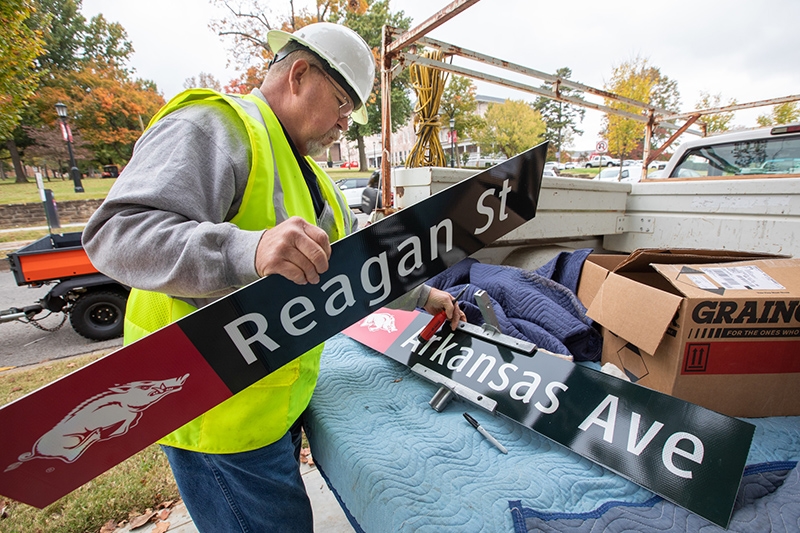
Staff at the University of Arkansas were invited to participate in a confidential online Staff Campus Climate Survey in May. The purpose of the survey is to measure perceptions, attitudes, job satisfaction and engagement levels of current staff, identifying strengths and concerns about issues in the workplace, professional development, compensation, benefits, access to resources and other topics.
The number of staff members who completed the survey increased slightly from 2017, when the survey was first conducted. Of the university's 3,259 staff members, 1,104 or 33.8% responded in 2019, up from 31.9% staff participation in the previous survey. The survey included 109 questions divided into seven primary sections focused on work experience, work unit, the university, supervisors, leadership, satisfaction and benefits.
The results of this year's survey show several improvements over the 2017 survey including an improvement in almost every overall category among classified employees.
Among all staff, satisfaction with health care benefits and knowledge of how to report violations and grievances both showed significant improvements from the 2017 survey.
"We saw an increase in positive feedback for all five questions related to assessing staff knowledge about how to report complaints and concerns when compared to the previous survey," said Mervin Jebaraj, director of the Center for Business and Economic Research in the Sam M. Walton College of Business. "Three of those five questions received a positive response of between 81% and 90% of all responses."
The percentage of positive responses among all staff decreased in some categories when compared to the previous survey, with an increase in neutral responses accounting for the majority of those changes.
Responses to questions in related sections were grouped together for comparison in the report. The results among all staff are positive in many areas including:
- Satisfaction with leave benefits, 83% positive
- Satisfaction with retirement benefits, 78% positive
- Satisfaction with supervisors, 79% positive
- Perceived supervisor support, 76% positive
- Intrinsic work experience, 74% positive
- Overall engagement rate, 68% positive
- The New Inclusion Quotient Index, a metric which measures the culture and habits of inclusion at the university, 60% positive
The remaining percentages above include both neutral and negative responses.
Feedback regarding global satisfaction with job, pay and the university was also mostly positive at 59%, but declined by 4% since the 2017 survey.
Staff Senate officers meet monthly with Chancellor Joe Steinmetz to collaborate on ways to continue the progress made in recent years to enhance pay and benefits for university employees.
"Improving wages for employees across campus is a complex, long-term effort but we've greatly improved the situation in the last few years," said Trish Watkins, chair of the University of Arkansas Staff Senate, the representative body the chancellor turns to for advocacy on behalf of staff. "And we're currently working on several ideas to continue to incrementally increase compensation, especially for classified employees.
"And we're always looking for ways to preserve and improve the benefits our employees receive. I'm not sure everyone knows that the university's tiered structure for health care premiums and parking means that health care premiums are lowest for those making the least and increase proportionately as salary increases, while staff who earn less than $40,000 a year pay 45% less for parking than employees with higher salaries."
Chancellor Steinmetz also made the decision to preserve a 90% tuition discount for all of the U of A's full-time active benefits-eligible employees, and a 50% discount for their spouses and eligible dependent children.
Some survey feedback was less than 50% positive including:
- Dependent life insurance, 47% positive
- Flexible spending accounts for healthcare reimbursement, 45% positive
- Flexible spending accounts for dependent care reimbursement, 30% positive
- Perceived organizational support, 39% positive
The remaining percentages above include both neutral and negative responses.
The full report also provides response breakdowns based on gender, classified and non-classified status, salary levels, age, college and unit.
The survey was developed by faculty and staff in the Sam M. Walton College of Business, in collaboration with Staff Senate and Human Resources, with the Center for Business and Economic Research analyzing the results.
Topics
Contacts
Mark Rushing, assistant vice chancellor
University Relations
479-575-5555,